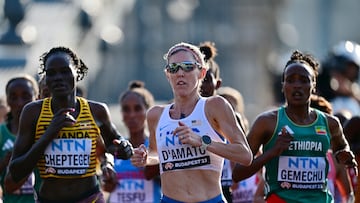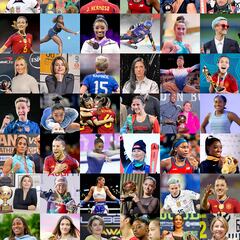Olympic athlete dies after being set on fire by her boyfriend: what we know
Rebecca Cheptegei, who competed at the 2024 Paris Games, did not recover from horrific injuries sustained after her boyfriend doused her with petrol.

The shocking death of Ugandan Olympic marathon runner Rebecca Cheptegei has been confirmed, this following her name hitting the headlines some days ago, and raising further conversations about gender-based violence. At just 33, the athlete, who competed in the Paris Olympics this summer, died on Thursday after a horrific attack in Kenya that saw her boyfriend reportedly douse her in petrol and set her on fire. This tragic incident, which took place last Sunday, is said to be the third female athlete in Kenya to lose her life to violence since 2021.
Cheptegei, who finished 44th in the Paris Olympic marathon, suffered burns covering more than 75% of her body. Despite the best efforts of doctors at Moi Teaching and Referral Hospital in Eldoret, where she was admitted, her injuries were too severe, and her organs ultimately failed.
Uganda Olympic Committee President Donald Rukare took to social media to express his sorrow and condemn the violence.
“We have learnt of the sad passing on of our Olympic athlete Rebecca Cheptegei following a vicious attack by her boyfriend. May her gentle soul rest in peace.”
We have learnt of the sad passing on of our Olympic athlete Rebecca Cheptegei OLY following a vicious attack by her boyfriend. May her gentle soul rest in peace and we strongly condemn violence against women. This was a cowardly and senseless act that has led to the loss of a… pic.twitter.com/V8Mog3oMOX
— Donald Rukare (@drukare) September 5, 2024
Kenya’s Sports Minister Kipchumba Murkomen also addressed the loss, calling it a blow “to the entire region” and stressing that gender-based violence, particularly in the elite sports world, has become an alarming issue in recent years.
Is violence against female athletes becoming more common?
Tragically, as said, Cheptegei’s case is not an isolated one. In October 2021, Kenyan Olympic runner Agnes Tirop was found dead in her home with multiple stab wounds to the neck. Her husband, Ibrahim Rotich, is facing murder charges, though he has pleaded not guilty.
Tirop’s death sparked national outrage and led to the creation of ‘Tirop’s Angels,’ a nonprofit dedicated to fighting domestic violence. One of the organization’s founders, fellow marathon runner Joan Chelimo, pointed out that successful female athletes are often targeted by men who see them as financial opportunities.
“They get into these traps of predators who pose in their lives as lovers,” Chelimo told Reuters. Cheptegei’s death only further highlights the vulnerability of women in the public eye, especially those with perceived financial success.
I have just received disturbing news about the tragic death of Uganda's athlete Rebecca Cheptegei this morning in Kenya.
— Peter Ogwang (@OgwangOgwang) September 5, 2024
The Kenyan authorities are investigating the circumstances under which she died and a more detailed report & program will be provided in due course.
The… pic.twitter.com/arFgVhmSSz
Is gender-based violence on the rise in Kenya?
The numbers don’t paint a pretty picture. A 2022 survey by the Kenyan government revealed that 34% of women aged 15 to 49 have experienced physical violence, with married women particularly at risk. The problem is not confined to Kenya, either. A report from UN Women and the UN Office on Drugs and Crime showed that African countries collectively recorded the highest number of female killings in 2022 – both in total numbers and in proportion to their female population.
Related stories

Women without limits
Uganda’s Minister of State for Sports, Peter Ogwang, has called for swift justice for Cheptegei, assuring that Kenyan authorities are already investigating the case: “This tragedy has shone a harsh spotlight on the violence faced by women.”
What can be done to prevent more tragedies?
As Cheptegei’s death continues to be investigated, the broader issue of violence against women in sports has come under renewed scrutiny. Many are calling for more concrete protections to be put in place for female athletes, who are too often left vulnerable to exploitation and abuse. Organizations like the aforementioned Tirop’s Angels have been working tirelessly to raise awareness and offer support, but much more needs to be done to tackle the root causes of gender-based violence.

Complete your personal details to comment